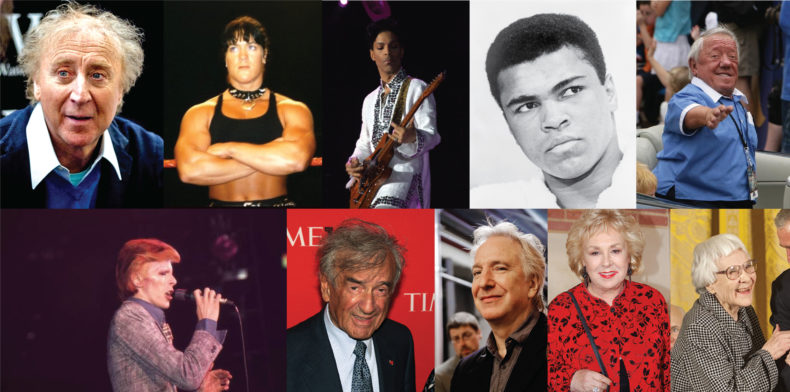
2016 has been ruthless. Yesterday, Gene Wilder died. In July it was Elie Wiesel and Miss Cleo. In June it was Muhammad Ali. In April it was Chyna and Prince. In January it was David Bowie and Alan Rickman.
In 2016 we grieve in public, on social media. When Prince died people wrote millions of Tweets about his life and impact. We also grieve quickly. And I’ve recently noticed we grieve in a cycle.
Yesterday I drew a silly graph about that cycle. But I wanted to break it down a little bit more here.
I drew a graph of what happens when famous people die. pic.twitter.com/CAtUprPnO8
— Rose Eveleth (@roseveleth) August 29, 2016
The grieving always starts with praise. These are icons, people who shaped popular culture in the United States and beyond. Watching Young Frankenstein as a kid opened up an entire type of humor to me that I had never encountered before. David Bowie taught me, and so many others, that it’s okay to be a weirdo. These people are famous and beloved for a reason. And when they die, we grieve and celebrate their lives publicly because that’s where we engaged with them when they were alive too.
That’s step one.
Then comes the seemingly inevitable wave of “well, actually’s.” Did Bowie commit statutory rape? Did Eli Wiesel ignore the suffering of Palestinians? Ali has a complicated history, full of both fighting for civil rights, and saying things like “no intelligent person wants to mix races.” Gene Wilder, his body barely even cold, is even in the mix here. Stat wasted no time posting a story asking why the actor didn’t tell people he had Alzheimers. “Gene Wilder died of Alzheimer’s. Why didn’t his family disclose his diagnosis?” their Tweet asks.
Step three is the inevitable wave of finger wagging. Now is not the time for that. Let us celebrate their lives. How dare you disparage such a great person. When Supreme Court Justice Antonin Scalia died, many celebrated the death of a justice who fought against social progress. But just as many decried these celebrations, calling them rude, disgusting and worse. The Twitter back and forth was both predictable and virulent. You know how these things go.
Next we get the also inevitable wave of think pieces about the nature of remembrance. Is it okay to speak ill of the dead? Of course it is, but at what point? When is the right time to point out that someone might not have been a spotless idol. How do we remember Bowie and Ali and Wiesel? Who writes their history? When Margaret Thatcher died, Glenn Greenwald argued that the doctrine of not speaking ill against the dead didn’t apply to people of such influence. Others disagreed.
Then, because it’s Twitter, all hell officially breaks loose, and the fights truly begin. And then in a few days we just start the whole thing over again. What a great platform!
I’m not here to tell people not to Tweet their feelings about celebrity death. Those arguments have been made, and I think they’re dumb. Policing other people’s grief is rude and counterproductive. (Brands on the other hand, maybe just… stop.) But I think the question of memory, and of what a public and mass social mourning does to the way we remember, is really interesting. This isn’t only a conversation we have about the dead, of course. There are people living today whose legacy is already being debated: R. Kelly, Woody Allen,Louis C.K., Bill Cosby. Men (and doesn’t it always seem to be men?) who contributed so much art and culture, but who also did other things, gross things, sometimes evil things, that we don’t really know what to do with their legacy. Many people are struggling with this now, while they’re alive. When they die, this graph will play out again, and again, and again.
It will run when lesser debated figures die too, when your weird uncle dies, when the dog walker or the sort-of-friend from college dies. Because everybody has something that someone can say “well actually,” about. And everybody dies.
Top images from Wikimedia Commons